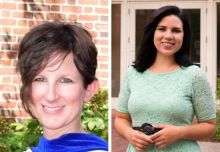 Introduction to Volume Two of the Special Issue: Developing undergraduate community psychology pedagogy and research practice
Introduction to Volume Two of the Special Issue: Developing undergraduate community psychology pedagogy and research practiceLauren F. Lichty, Eylin Palamaro-Munsell, and Jen Wallin-Ruschman
Undergraduate Special Issue Editor's Note
Welcome to the second volume of the Special Issue centering community psychology (CP) teaching and research within primarily undergraduate institutions. This Special Issue seeks to provide a much needed platform for developing and disseminating undergraduate-focused pedagogical and research-related practices. The introduction to Volume One describes in detail how this project emerged.
Read more... Community Psychology at a Regional University: On Engaging Undergraduate Students in Applied Research
Community Psychology at a Regional University: On Engaging Undergraduate Students in Applied ResearchPeer Reviewed
Engaging students in service learning projects grounded in community psychology values and practices when working in a rural, conservative area provides several challenges and opportunities for faculty members. The authors share processes and outcomes from three case examples taking place between 2010 and 2013: (1) running focus groups and survey development with a local YMCA branch that predominantly serves people of color in low income housing, (2) the development of a strategic plan for the implementation of an art crawl in the local downtown community, and (3) the development and execution of an asset map evaluating supportive resources and spaces available to the local LGBTQA community.
Read more... Development of Community Psychology Undergraduate Course from a Feminist Pedagogical Framework: Faculty and Students
Development of Community Psychology Undergraduate Course from a Feminist Pedagogical Framework: Faculty and StudentsPeer Reviewed
Community psychology is typically not a part of most undergraduate curricula. Yet, undergraduate coursework in community psychology affords many advantages to students. It encourages ecological thinking and exposes students to content such as community empowerment, intervention and prevention programming design, program evaluation, and other aspects of community psychology practice. This paper describes the development of a community psychology course taught from a feminist pedagogical framework within an undergraduate-only psychology program at a mid-size comprehensive public university in the United States.
Read more... Community Psychology in the Community College Setting: Strengths and Challenges
Community Psychology in the Community College Setting: Strengths and ChallengesPeer Reviewed
Within the field of community psychology there is growing recognition of the role of undergraduate education in community psychology training as a primary introduction to the field. In this [recent] discourse however, the unique position of the community college has been rendered invisible.
Read more... Learning through Doing: Reflections on the use of Photovoice in an Undergraduate Community Psychology Classroom
Learning through Doing: Reflections on the use of Photovoice in an Undergraduate Community Psychology ClassroomPeer Reviewed
Photovoice is becoming an increasingly popular research method in the field of Community Psychology (CP). This is, in part, because it reflects some of the values of CP, including respect for diversity and participation and collaboration. More recently, photovoice has also been used in undergraduate classrooms as a way to actively engage students in their learning, to enable students to investigate and address social problems of importance to them, and to help students develop self-efficacy skills. Accordingly, in this article, an Assistant Professor of Community Psychology and six of her former undergraduate students reflect on their experiences of the Community Psychology, Research, and Action course she taught at an urban-serving university in Washington in spring 2016, which was centered around the learning and implementation of a student-directed photovoice project about their campus.
Read more... “Lessons that simply cannot be lectured”: Highlighting the experiences and benefits of undergraduates engaged in community psychology research
“Lessons that simply cannot be lectured”: Highlighting the experiences and benefits of undergraduates engaged in community psychology researchPeer Reviewed
Globally, Community Psychology (CP) currently struggles with a lack of visibility and a shortage of platforms from which to engage future researchers and practitioners. Many of these future researchers and practitioners study psychology as part of their undergraduate education, making psychology departments in undergraduate institutions an ideal point of exposure. Discouragingly, however, undergraduate students are unlikely to be exposed to CP in their course curriculums forcing students to seek out opportunities for exposure elsewhere (Jimenez, 2016; Glantsman, McMahon & Njoku et al., 2015).
Read more... Promoting Undergraduate Student Engagement in the SCRA Biennial Conference
Promoting Undergraduate Student Engagement in the SCRA Biennial ConferencePeer Reviewed
There are many benefits for undergraduate students who attend professional conferences, such as having increased confidence for conducting research, gaining a better understanding of a field, developing a professional identity, and improving abilities to network.The project described includes a systematic reflection from six undergraduate students from SUNY Old Westbury and their faculty mentor about the group’s attendance at the 2017 SCRA Biennial Conference.
Read more... Developing an Undergraduate Community Psychology Program in a Graduate Institution
Developing an Undergraduate Community Psychology Program in a Graduate InstitutionPeer Reviewed
This article provides an overview of the undergraduate degree program in community psychology at DePaul University. The recommendation of an undergraduate student ignited latent student and faculty interest. A program-bigger than a course but smaller than a major-was developed in 2005-2006 and was first offered in 2006-2007. Subsequently, this Community Concentration has been well received by students and has grown to an enrollment of about 20-25 students annually (Glantsman, McMahon, & Njoku, 2015). Graduates have gone onto positions in community and public agencies, graduate school in community psychology and related fields, and other relevant contexts.
Read more...This issue is the second of two, highlighting the challenges and successes of undergraduate education in community psychology. We are excited by this work and hope that it inspires our readers to have conversations with their colleagues about how to encourage systemic and institutional support for these programs.